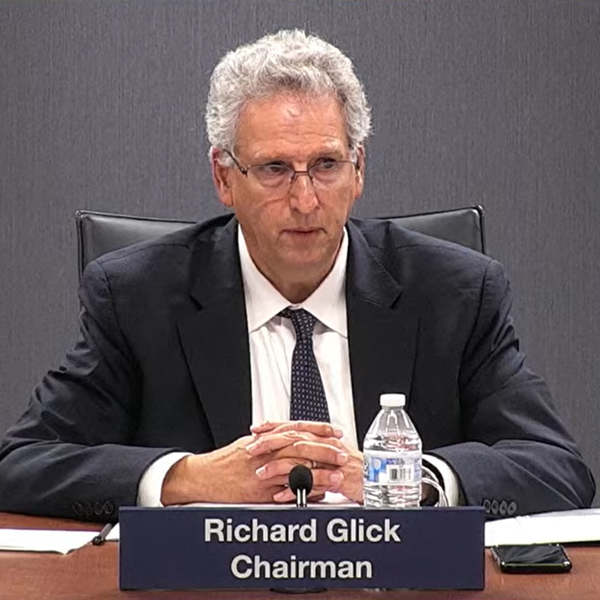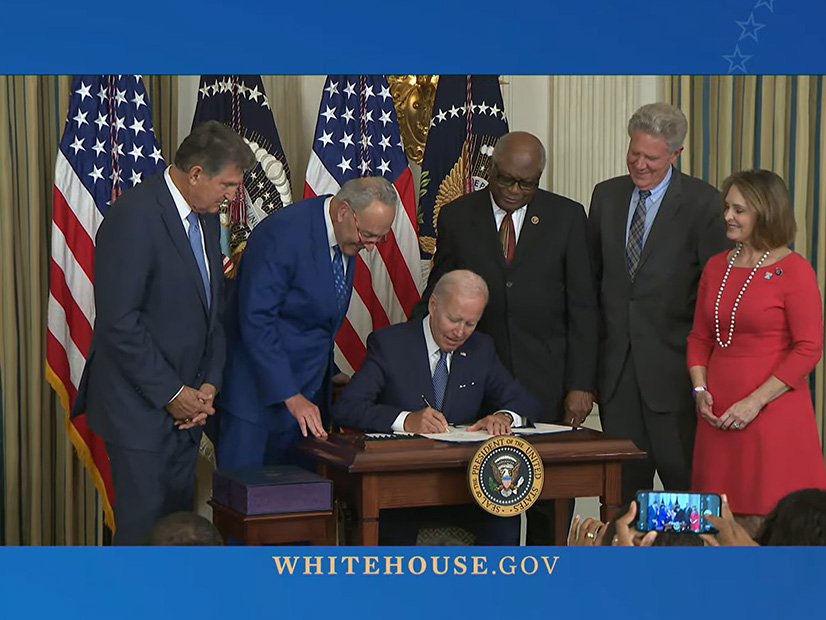
Sen. Joe Manchin (D-W.Va.) said last week he won’t call a hearing on President Biden’s nomination of Richard Glick to remain as FERC chair, dimming the five-year commissioner’s chance of returning for a second term.
Manchin, chair of the Senate Energy and Natural Resources Committee, said through a spokeswoman that he would not bring Glick’s renomination up for a hearing despite his backing from Biden. Manchin “was not comfortable holding a hearing,” spokeswoman Sam Runyon said in an email Thursday, declining further comment.
Glick joined the commission in November 2017 after serving as general counsel for the Democrats on the committee. Biden named him chair in January 2021 and renominated him for a new term in May.
But Manchin — who was angered earlier this year by the commission’s proposal to consider greenhouse gas emissions in natural gas infrastructure certificates — never endorsed him.
At an ENR Committee hearing in March, Manchin accused Glick of pursuing a partisan climate agenda that undermined U.S. energy security. Although Glick defended the original policy statement at the hearing, a month later FERC walked the policy statements back, labeling them as drafts and saying any new rules would apply only to future projects (PL18-1). (See FERC Backtracks on Gas Policy Updates.)
| FERC
Glick’s fortunes also may have suffered from Manchin’s testy relationship with Biden.
When Manchin — a pivotal vote in the 50-50 Senate — announced in December that he would not support the president’s Build Back Better climate plan, the White House blasted him for what press secretary Jen Psaki called “a sudden and inexplicable reversal in his position and a breach of his commitments to the president and the senator’s colleagues in the House and Senate.” (See Manchin Says ‘No’ on Build Back Better.)
Relations appeared to have improved when Manchin agreed to the smaller Inflation Reduction Act, and the senator took part in Biden’s signing ceremony in August.
But Manchin was angered anew earlier this month when Biden referred to the Brayton Point power plant in Somerset, Mass., during a speech. Part of Brayton Point — New England’s largest coal-fired plant when it shuttered in 2017 — is being repurposed to a subsea cable manufacturing facility to service the offshore wind industry. “We’re going to be shutting these [coal] plants down all across America and having wind and solar,” Biden said on Nov. 4.
“Comments like these are the reason the American people are losing trust in President Biden,” Manchin responded in a statement Nov. 5. “Being cavalier about the loss of coal jobs for men and women in West Virginia and across the country who literally put their lives on the line to help build and power this country is offensive and disgusting. The president owes these incredible workers an immediate and public apology, and it is time he learn a lesson that his words matter and have consequences.”
White House Press Secretary Karine Jean-Pierre said later that Biden’s words had been “twisted.”
“The president was commenting on a fact of economics and technology: As it has been from its earliest days as an energy superpower, America is once again in the midst of an energy transition,” Jean-Pierre said.

Manchin’s surprising criticism of his party’s president — coming days before the midterm elections — was unconvincing to conservatives, who noted the senator’s crucial support for the IRA.
New York Post commentator Miranda Devine criticized what she called Manchin’s “faux outrage.”
“He knew what Biden was when he caved in and voted for the so-called ‘Inflation Reduction Act,’ which was the Green New Deal in disguise,” she tweeted.
“Well, sorry, Sen. Manchin, but you single-handedly gave this president more, not less, power to gut our fossil fuels with the idiotic climate bill!” commentator Laura Ingraham tweeted. “You helped create this monster.”
‘Confident’
Whatever the reason for Manchin’s decision, it appears to leave Glick little more than a month to complete his legacy at the commission. Although Glick’s term expired June 30, he can remain in his post through the end of the lame duck congressional session, scarcely enough time to complete all of the major rulemakings he began, including transmission planning and cost allocation (RM21-17) and interconnection policy (RM22-14), in addition to the pipeline policy statement.
News of Manchin’s rejection was not mentioned Thursday during FERC’s annual technical conference on reliability. (See related story, FERC Panelists Talk Cyber, Grid Transformation Challenges.)
“Like I’ve said before, I worry about the things I can control. The things I can’t control, I don’t worry about,” Glick told E&E News during a break in the conference. He added that he spoke to Manchin on Wednesday night and was not told much more than the statements released by the senator’s office. “We’ll see what happens,” Glick said.
Glick left the conference early, citing another appointment.
Speaking in October at the American Council on Renewable Energy’s (ACORE) Grid Forum, Glick said Senate Majority Leader Chuck Schumer (D-N.Y.) and his backers in the White House were “working hard towards confirmation.” (See Scenario Planning, Magical Thinking and Energy Efficiency.)
“They are confident,” Glick said, before turning fatalistic. “We have a lot of day-to-day work to do. [I] try to focus on that on a daily basis, and whatever happens, happens.”
ClearView Energy Partners cited Energy Information Administration data that West Virginia produced almost 91% of its power from coal in 2021, and noted that the state exports about half the power it generates.
“The impact of ‘shutting down’ all coal capacity appears to bode ominously for West Virginia’s economy, independent of Chairman Manchin’s personal investments in the coal sector,” ClearView said. “The White House’s overall decarbonization agenda may be overshadowing Chairman Manchin’s concerns over FERC policy — and the pending renomination may be one of the few levers available to him to push back against it.”
Deadlock?
News of Manchin’s decision sparked discussion on Energy Twitter over how long the commission might be without a fifth commissioner and whether it would face a deadlock between Democrats Allison Clements and Willie Phillips and Republicans James Danly and Mark Christie.
But while Christie was highly critical of the Democrats’ original pipeline policy statement, he has often sided with them on other issues, with Danly often the lone dissenter.
Former FERC Chairman Neil Chatterjee said a 2-2 party split would not deadlock the commission.
Christie “is already at the table negotiating on transmission. And if three votes come together on pipelines, they will move forward regardless of who is chair,” he tweeted. “I had 2-2 for almost a year, and we got a ton of significant things done. … Everything at FERC will be fine.”




